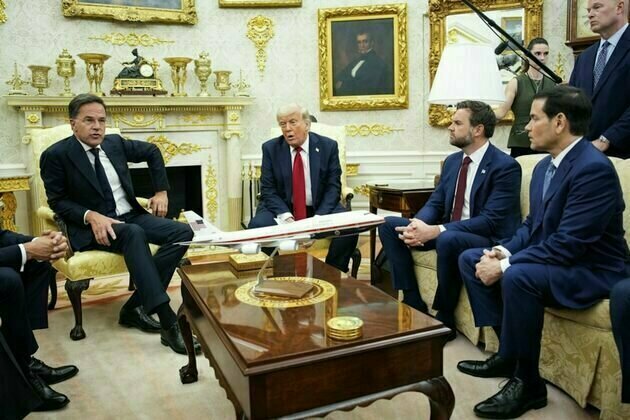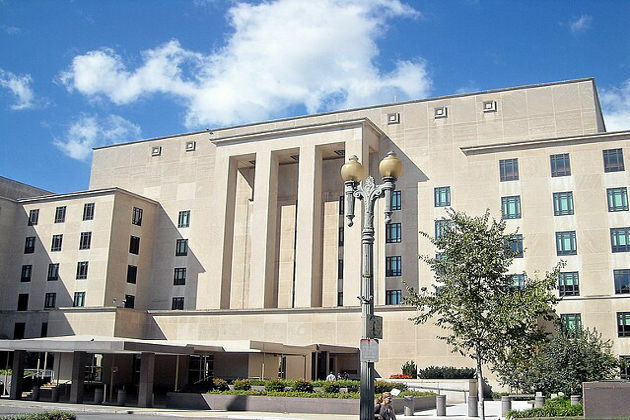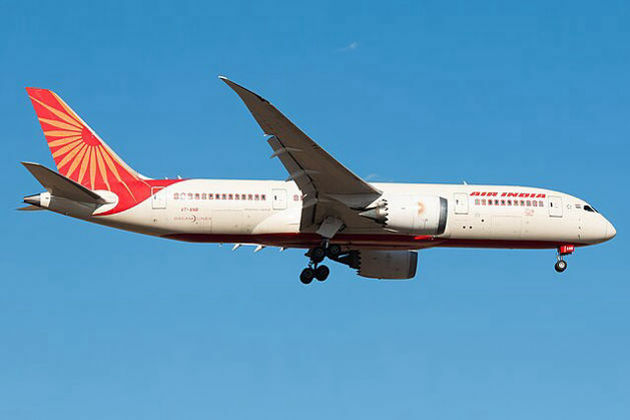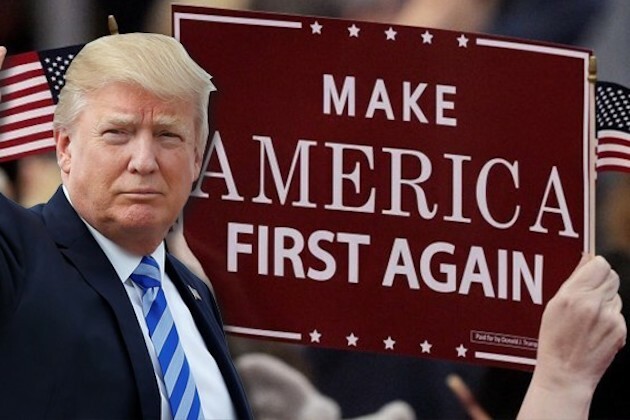What Trump's decision to send more weapons to Ukraine will mean for the war
The Conversation
15 Jul 2025, 16:35 GMT+10

At face value, Donald Trump's announcement about his plans on Russia and Ukraine look like a major policy change. Speaking from the Oval Office on July 14, where he had been meeting with Nato secretary general Mark Rutte, the US president said he would send "top-of-the-line-weapons" to help Kyiv and - unless a ceasefire deal is agreed inside a 50-day time limit - the US would impose secondary sanctions on any countries dealing with Russia.
But while this represents a significant departure from Trump's previous approach, it's more of a step back towards the policy approach of his predecessor Joe Biden than the U-turn that some commentators are claiming.
For months Russia has stepped up its bombardment of Ukraine, buoyed by the fact that neither the US Congress nor the White House has authorised any new military aid to Kyiv. Moscow would have been aware of this lack of US action and its missile and drone attacks against Ukraine have aimed to run down the stocks of air defence missiles supplied by Biden while paying lip service to the idea of peace negotiations.
For Trump the penny appears finally to have dropped as to what was happening. His frustration and disappointment in Putin is what has finally led to him calling this out. According to Trump, Putin "fooled a lot of people - Clinton, Bush, Obama, Biden - he didn't fool me. At a certain point talk doesn't talk, it's got to be action".
The decision to send new supplies of defensive - and potentially even longer-range offensive missiles - to Ukraine (even if the Europeans pay for them) is an important signal to Russia. But so too is the threat of tariffs of 100% on countries, such as India and China, that sustain the Russian economy by buying its oil and gas at knockdown prices.
The US senate, led by Lindsay Graham, the influential Republican senator for South Carolina, has been itching to pass these secondary sanctions for months. Now that the Trump administration appears to have adopted this plan it is a significant policy instrument to pile the pressure on Russia.
The change in Trump's approach may also mean that the $US8 billion (Pound 6 billion) of frozen Russian assets in the US (and US$223 billion in Europe) could be released to aid Ukraine, which would provide a ready means to pay for the US arms transfers.
What has not changed, however, is the goal of Trump's policy towards the war in Ukraine. While the Biden administration called out the illegality of Putin's unprovoked aggression and called for the restoration of Ukrainian sovereignty, Trump is merely calling for a ceasefire.
Trump may say he is "disappointed" with Putin, but he has not labelled him as the aggressor. In fact at one point he was blaming Ukraine for the invasion. And, significantly, he has not demanded that Russia give up the 20% of Ukraine that it currently illegally occupies.
The US president is also silent on what the US would commit to in terms of security and stability for Ukraine after the fighting stops. This is a much bigger question than Ukraine's Nato membership. America's European allies in Nato regard some sort of stability force on Ukrainian territory as necessary to deter any future Russian aggression.
Whether or not US troops would be involved (and all the signs are that they would not), some sort of US security "back-stop" or guarantee is still seen in Europe as key to its success - as would be US logistical and intelligence support for its operation.
Another aspect of the change in Trump's policy is the long lead time that Russia has been given to come to the table. A lot of Ukrainian civilians are likely to die during this period if the intense bombardment continues. On the battlefield, 50 days would give the Russians an extended window during a renewed summer offensive to make further territorial gains inside the occupied provinces.
So Trump's proposals have to be viewed through the prism of his propensity to set deadlines that are then pushed back multiple times - as with the on-again, off-again tariffs, which have given Trump the nickname Taco ("Trump always chickens out") on Wall Street.
Russian senator, Konstantin Kosachev, was certainly taking this view when he told the BBC after Trump's announcement that, "if this is all Trump had to say about Ukraine today, then so far it's been much ado about nothing".
This sentiment was shared by the Russian stock market which rose 2.7% in the aftermath of Trump's announcement. Analysts had expected much worse, so the long delay in the prospect of anything actually happening was clearly seen as a long way off and potentially subject to change or cancellation. Trump is seen by many as both inconsistent in his threats and unpredictable as to where policy will eventually settle.
The fact that Trump told BBC Washington correspondent Gary O'Donoghue that while he was "disappointed" with Putin, he was "not done with him" - and his clear reluctance to act quickly and decisively in sanctioning Russia - should be seen as an important counterpart to the apparent policy shift.
Like so many things with the 47th US president, it's important not to react to the media appearances or the headlines they provoke, without also paying attention to the policy actions of his administration.
 Share
Share
 Tweet
Tweet
 Share
Share
 Flip
Flip
 Email
Email
Watch latest videos
Subscribe and Follow
Get a daily dose of Milwaukee Sun news through our daily email, its complimentary and keeps you fully up to date with world and business news as well.
News RELEASES
Publish news of your business, community or sports group, personnel appointments, major event and more by submitting a news release to Milwaukee Sun.
More InformationInternational
SectionAmid 787 crash probe, FAA affirms Boeing switch design is safe
WASHINGTON/NEW DELHI/MONTREAL: Amid scrutiny following a fatal Boeing 787 crash in India, U.S. aviation regulators and Boeing have...
Diplomats, lawmakers slam mass layoffs at US State Department
WASHINGTON, D.C.: The U.S. State Department dismissed over 1,300 employees on July 11, as part of a sweeping reorganization initiated...
Air India crash: Engines shut down seconds after takeoff, killing 260
NEW DELHI, India: A preliminary investigation into the Air India crash on June 12 in Ahmedabad has revealed that a shift in the fuel...
Sources: Meta won’t alter data model, faces fresh EU charges
BRUSSELS, Belgium: Meta is holding firm on its controversial pay-or-consent model, a move that could lead to fresh antitrust charges...
Trump’s tariff push could push US rates above 20%, ICC says
LONDON, U.K.: American consumers and businesses could soon face the highest overall tariff burden in more than a century, according...
U.S. Urged to Investigate After Israeli Settlers Beat Palestinian-American to Death
The family of Sayfollah Saif Musallet, a 20-year-old American citizen who was beaten to death by Israeli settlers in the occupied West...
Wisconsin
SectionDiplomats, lawmakers slam mass layoffs at US State Department
WASHINGTON, D.C.: The U.S. State Department dismissed over 1,300 employees on July 11, as part of a sweeping reorganization initiated...
MLB roundup: Red Sox top Rays to extend win streak to 10
(Photo credit: Brian Fluharty-Imagn Images) Ceddanne Rafaela hit a two-run home run to help the Boston Red Sox stretch their winning...
Dodgers' two-out rally puts away rival Giants in extras
(Photo credit: D. Ross Cameron-Imagn Images) The Los Angeles Dodgers strung together two-out bloop singles by Freddie Freeman and...
Brewers rout Nationals, claim seventh win in a row
(Photo credit: Benny Sieu-Imagn Images) Jackson Chourio had a three-run homer and Brice Turang added a solo shot to back a dominant...
Brewers OF Sal Frelick exits game with hamstring injury
(Photo credit: Benny Sieu-Imagn Images) Milwaukee Brewers right fielder Sal Frelick left Sunday's game against the Washington Nationals...
With a rejuvenated Jackson Merrill, Padres pursue sweep of Phillies
(Photo credit: David Frerker-Imagn Images) Say this much for San Diego Padres center fielder Jackson Merrill. When he snaps a slump,...












